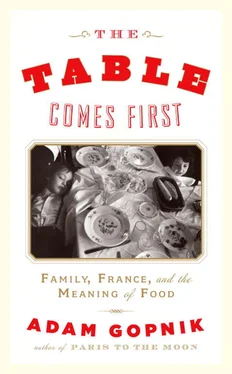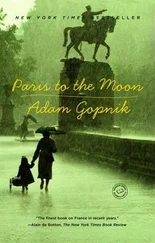Still, you have to wonder how well the food fits in the book. The purpose of the scene, after all, is not to teach a recipe but to paint a mood—to show the lonely Spenser as somehow more modern, broader in interests and resources, than lonely city detectives in fiction often are. Down these mean streets walks a man with a recipe in his head. What the reader recalls, though, is not the setting but the dish. Should the food come off the page onto the plate quite so readily, overwhelming the atmosphere, and does this indicate that there is something subtly off, nonfunctional, about the presence of elaborate food-making in fiction?
Rising to a higher level of culinary ambition, I went on to make, the following night, a fish-stew recipe, a kind of English bouillabaisse, from Ian McEwan’s superb Saturday: Henry Perowne, the central character, a neurosurgeon, cooks this elaborate dish as he watches “monstrous and spectacular scenes” on television. Henry, though confessedly inexpert, is a convincing home cook; he admits that he belongs to the chuck-it-in school, the hearty school of throwing ingredients together in a pot—he likes the “relative imprecision and lack of discipline.” In the passage I was following, he makes a tomato-and-fish stock for his stew, and, at the same time, starts prepping the rest. He “empties several dried red chillies from a pot and crushes them between his hands and lets the flakes fall with their seeds into the onions and garlic,” before adding “pinches of saffron, some bay leaves, orange-peel gratings, oregano, five anchovy fillets, two tins of peeled tomatoes.” Then he takes some mussels from a string bag, throws those, with the skeletons of three skates, into a stockpot, and tips some Sancerre into the tomato sauce. Meanwhile, he readies monkfish, slicing tails into chunks, a few more mussels, and, finally, some clams and prawns. All the while, he is watching on the mostly muted television the run-up to the Iraq war—marchers in London, Colin Powell at the U.N.—and brooding on life in our time.
McEwan is obviously painting a picture of l’homme bourgeois as he is today, his hands filled with fish, his mind with intimations of terror. (McEwan really is serving this dish to his readers; a revised version of the recipe is right there on his Web site.) It’s a tribute to McEwan’s powers of persuasion that the scene would never work that way in reality. You can’t idly make a bouillabaisse while you brood on modern life any more than you can idly make a cassoulet; these are nerve-wracking concoctions. The mussels, which Henry drops into his stock straight from a string bag, need at a minimum to be spray-washed, and probably cleaned and checked for those obscene little beards they have. European mussels have fewer of these, it’s true—more like soul patches. (Later on, Henry scrubs the mussels, but he seems to be doing it absentmindedly, and you can’t do it absentmindedly.) The fish needs to be taken from its wrappings and washed; and then how fine do you chop the garlic, and are you sure the alcohol has boiled off from the wine? The “orange-peel gratings” are a story in themselves, since all the experts insist that you avoid getting any white pith in with them, and this is about as difficult as writing a villanelle. (It doesn’t actually matter much, but they say that it does.) Worse than that, having crushed a “handful” of those little dried peppers between your fingers means that you have to wash your hands instantly, with soap, since nothing is more common among home cooks like Henry than wiping a tear from your eye while chopping the onions, your hand still contaminated by hot pepper, with horrific results.
While you are doing all this, I was reminded as I did it, you are thinking about the bouillabaisse, not about life in our time. Or, rather, you are not thinking about the bouillabaisse, or about anything: you are making the bouillabaisse. And here, I suspect, lies the difficulty with using cooking as the stock for the stream-of-consciousness stew. It is that the act of cooking is an escape from consciousness—the nearest thing that the nonspiritual modern man and woman have to Zen meditation; its effect is to reduce us to a state of absolute awareness, where we are here now of necessity. You can’t cook with the news on and still listen to it, any more than you can write with the news on and still listen to it. You can cook with music, or talk radio, on, and drift in and out. What you can’t do is think and cook, because cooking takes the place of thought. (You can daydream and cook, but you can’t advance a chain of sustained reflections.)
The recipes in these books are not, of course, meant to be cooked; they have literary purposes, and one of them is to represent the background of thought. Every age finds an activity that can take place while a character is meditating; the activity surrounds and halos the meditation. In Victorian fiction, it is walking; the character takes a long walk from Little Tipping to Old Stornsbury and, on the way, decides to propose, convert, escape, or run for office. But the walk as meditational setting and backdrop came to an end with Joyce and Woolf, who made whole walking books. In recent American fiction, driving was recessive enough to do the job; in Updike and Ann Beattie, characters in cars are always doing the kind of thinking that Pip and Phineas Finn used to do on walks. Driving and walking, however, do seem to be natural “background” actions. But you cannot have characters thinking while cooking; the activity is not a place for thought but in place of thought.
We need these devices in books, because we do not, in life, think our thoughts over time. Since our real mental life is made in tiny flashes in the midst of our routines, we have to stretch it out, taffy-like, in literature to cover a span of time worthy of it. If we accurately represented our mental life as it takes place—sudden impulses on the way to the washroom, a spasm of neurons unleashed over coffee—no one would believe it. Consciousness is not a stream but a still lock that suddenly drops into little waterfalls. The lengthy descriptions of cooking that we find in modern literature are a way of artfully representing, rather than actually reproducing, our mental life—a modeled illusion, rather than a snapshot of the thing.
So no matter how much cooking a novel contains, in the end it goes back to being a book, as all books will. Even cookbooks are finally more book than they are cook, and, more and more, we know it: for every novel that contains a recipe, there is now a recipe book meant to be read as a novel. When we read, in the great French chef Alain Ducasse’s recent Culinary Encyclopedia , a recipe for Colonna-bacon-barded thrush breasts, with giblet canapés, on a porcini-mushroom marmalade, we know that we are not seriously expected to cook this; rather, we are to admire, over and over, the literary skill, the metaphysical poetry, required to bring these improbable things together. You and I are not about to cook thrush breasts with a porcini-mushroom marmalade—Alain Ducasse is not about to cook them, either—any more than we are about to throw ourselves under the train with Anna or sleep with Madame Bovary.
The secret consolation may be that it works the other way around as well. The space between imaginary food in books and real food is the space where reading happens. The people we encounter in novels are ultimately mere recipes, too—so many eyes, so many bright teeth, so many repeated tics and characterizing mannerisms—and we accept that we cannot perfectly reproduce them, either. Our mental picture of Henry Perowne, like our mental picture of Lady Glencora Palliser, is as hard-won as the bouillabaisse from Saturday , as vague in critical aspects and as likely to vary from maker to maker, from reader to reader. (The characters in Flaubert are like the recipes in Escoffier; we are surprised to see how much is left out.) We read about Cabourg in Proust, and are unprepared for what we find when we actually get there. The act of reading is always a matter of a task begun as much as of a message understood, something that begins on a flat surface, counter or page, and then gets stirred and chopped and blended until what we make, in the end, is a dish, or story, all our own.
Читать дальше












